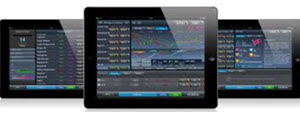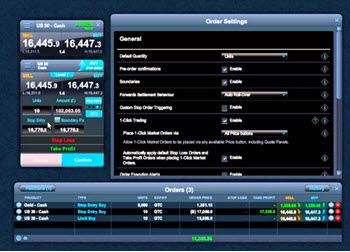CFD
CFD:s, Certificate for difference, is a type of financial instrument that allows you to trade on the stock market and a number of other markets with a large leverage. There are CFD:s available based on the currency market (Forex), the stock market, the commodity market and a number of other markets.  These certificates allow you to make huge profits on small market movements but they are also very risky to trade with since you risk loosing a lot of money when trading with CFD certificates. You can lose more money than you have invested when you trade CFD:s. If you lose more money than you have on your account then you need to deposit the money into your account to settle your debt to the broker.
These certificates allow you to make huge profits on small market movements but they are also very risky to trade with since you risk loosing a lot of money when trading with CFD certificates. You can lose more money than you have invested when you trade CFD:s. If you lose more money than you have on your account then you need to deposit the money into your account to settle your debt to the broker.
Please make sure that you understand all the risks before you start trading with CFD:s. They can be a very powerful tool and are very popular among day traders but they can also make you lose a lot of money. There are plenty of stories of investors that have lost their life savings because they didn’t not know how CFD:S work or the risk that they exposes you to.
Are they a scam?
No. CFD:s are a high risk instrument but they are not a scam. There are plenty of information out there about how they work and they have complete transparency. The market value of the certificates are decided by the value of the underlying financial instruments and outside the control of the broker. Anyone who says that they are a scam do not understand how they work. Most problems that users claim to be experience can be explained by delayed data on the screen and slow internet connections. The number one complaint is that the trades don’t go through at the values they see on the screen. This is due to the fact that the price of a CFD can change several times a second since the value of the certificates are based on the value of the underlying asset. By the time you see a value on the screen, react to it and choose to sell the value can have changed.
Does the broker make money when you lose money?
No. The broker does not make money if you lose money. All position are hedged on the open market. It is in the brokers interest that you make money. The more you trade and the more money you make the more the broker will make.
The broker makes money from the spread and overnight fees.
When is CFD:s a good option?
 A CFD is a good option when you are a very active trader that understands the risk and want a way to make large profits from small market movements. It is not a way to invest long term. You have to pay a fee if you want to keep your certificates over night. This fee is based on the positions size and compensates the broker for the cost of hedging the position on the open market.
A CFD is a good option when you are a very active trader that understands the risk and want a way to make large profits from small market movements. It is not a way to invest long term. You have to pay a fee if you want to keep your certificates over night. This fee is based on the positions size and compensates the broker for the cost of hedging the position on the open market.
CFD:s are never a good option if you are not able to monitor your positions.
How much money can I earn/lose?
There is never any limit to how much money you can earn. The more an asset goes up in value the more you will earn. How much you can lose is limited to the value of the underlying asset multiplied by the leverage.
Lets look at a an example: In this example you have purchased a CFD based on stock A that is worth USD 100. You hence paid USD100 for the CFD (We will ignore spread). The leverage is x250.
| Profit
Stock A goes up in value to USD102 and you decide to close your position. You will earn (102-100)*250 = 500. You end up with USD 500 in profit on your USD 100 investment. A 500% return. You earned 500% on your investment even though the stock only increased 2 % in value. This is the power of leveraged CFD:s. There is no limit to how much you can earn since there is no limit to how high the stock can rise. |
Loss
Your theoretical maximal loss is the value of the stock multiplied with the value of the stock when you purchased the CFD. In this case USD100 * 250 = 25 000. You can lose USD25 000. You can never lose more than that since a stock cant have a negative value. |
Tips for reducing your risk?
Most brokers allow you to use stop loses when you trade with CFD:s. I recommend that you always use them to limit your loses and protect your gains. This is especially true if you need to leave the computer for a while. I do however recommend that you always use it since you never know when there might be an internet downage or a power outage.
There are a number of ways that you can hedge your position to limit your loses. Most of them are too complicated to explain here and often includes using other financial instruments such as binary options as counter positions. These techniques are too complex to explain here but you should have no problem finding a number of good strategies for hedging by googling it. I hope to write an article about it at a later date.
This article was last updated on: July 9, 2017